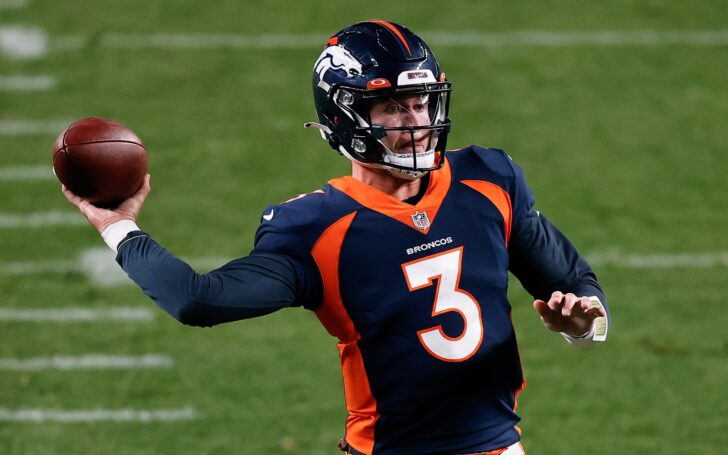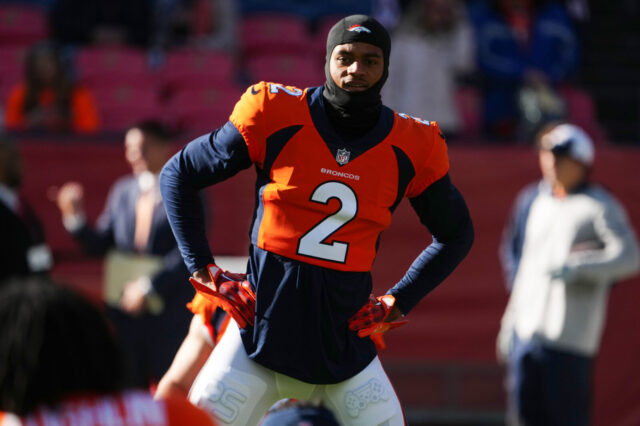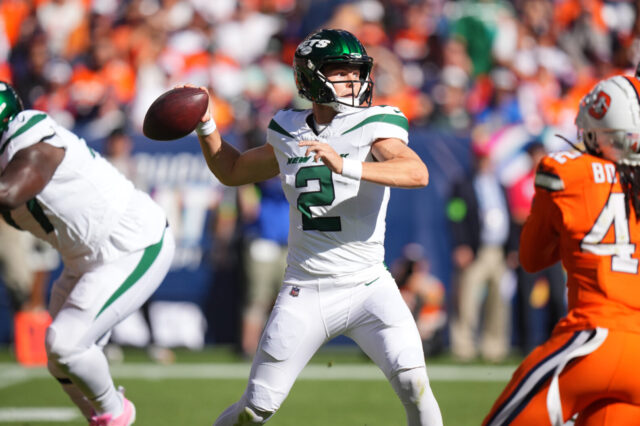Drew Lock is a rookie.
That’s exactly why Denver Broncos fans should temper their expectations. But they won’t.
Hey, Broncos fans are desperate, we get it. It’s been a long time since the orange and blue have had a world-class gun-slinger, and it’s also been five years since the team has made the postseason.
And in Denver, a few things have been constant since Pat Bowlen took over the team in the ’80s: A great quarterback and making the playoffs basically yearly.
Broncos fans desperately want Drew Lock to be “the guy,” the future of the team for the next 10 years. He’s getting his chance to prove himself, that’s for sure, and he has John Elway’s blessing to be the heir apparent at quarterback.
But, he’s far from a polished product.
Last year, Lock looked like a rookie when he fell on his throwing arm and injured his hand in preseason. He was finally given the ball in Week 13, going 4-1 as the starter to finish last year.
And those same fans who only see things through orange-tinted glasses will quote that record, missing the point that Lock was mostly mediocre in those games while the defense really gelled late last season.
That defense consistently pressured opposing quarterbacks down the stretch and ratcheted up their intensity against the run, holding three of five opponents to under 100 yards rushing.
But back to Lock, who Elway the GM built around these last few offseasons. First it was Courtland Sutton and Phillip Lindsay, before Lock was even with the team. Last year Lock was taken in the draft, along with key guard Dalton Risner and blossoming tight end Noah Fant. And this year the Broncos took Jerry Jeudy and KJ Hamler, two talented wide receivers, with their first two picks.
All eyes were on Lock and the offense on Monday night with the Tennessee Titans in town, and while Sutton and Hamler weren’t able to play due to injuries, the offense still had plenty of weapons to choose from.
And if you didn’t watch the game and only looked at his stats (14-17 for 142 yards and one touchdown in the first half) you’d think he was near-perfect. But, think again. On the Broncos’ first drive, he fumbled a snap from under center, under threw Tim Patrick and then was incomplete on a deep pass to Jerry Jeudy down the sideline.
Woof.
The offense found its rhythm on their second drive as Fant came alive. Lock, while pressured, rolled right and then threw back across his body to the tight end for a touchdown. It was an exciting play which resulted in a score, but, it was also a dangerous pass which will turn into interceptions if he continues to make it in future games. Basically, it was a rookie throw which worked out.
Later, Lock dropped a second snap, this time from the shot gun. Luckily, he recovered it and was able to gain two yards. And when he had another tight end — this time Nick Vannett — wide open in the end zone, Lock hurried and misfired on the throw.
That was a must-have touchdown, and Denver ended up with zero points on the drive, leaving the game knotted up at 7-7.
The second half wasn’t as kind to the Broncos’ offense. They went 3-and-out twice, falling behind 13-7.
But, then Lock looked like a veteran for one drive; he helped orchestrate a 12-play beauty which was capped off by a Melvin Gordon score. His confidence exuded on that drive, spreading the ball around and connecting with Jeudy for an explosive play.
That was the Drew Lock the Broncos need — efficient, deliberate, smart.
But, while Denver took the lead on that Gordon rushing touchdown, they couldn’t put the Titans away.
Tennessee answered the Broncos’ touchdown with a 3-and-out of their own but Denver gave it back five plays later. The Titans again went 3-and-out and when the Broncos needed to run the clock out, they were unable to gain a first down and punted it back after using just 1:01.
Veteran quarterbacks know how important those fourth-quarter drives are and they know how to salt away a win. Instead, Lock’s inaccuracy when it mattered most partially cost Denver a win.
Tennessee answered Denver’s two short drives with a game-winning field goal drive of their own, leaving the Broncos only 17 seconds in the 16-14 loss.
Overall, Lock was efficient in the first half but his mistakes were glaring. Dropping snaps cannot be a theme which continues throughout the season, and that missed touchdown arguably cost Denver the win. In the second half, while his confidence grew and he helped push the team for that key touchdown, his lack of ability to run the clock out on Tennessee resulted in a loss.
While there are flashes of brilliance he shows, Lock still has a long way to grow.



